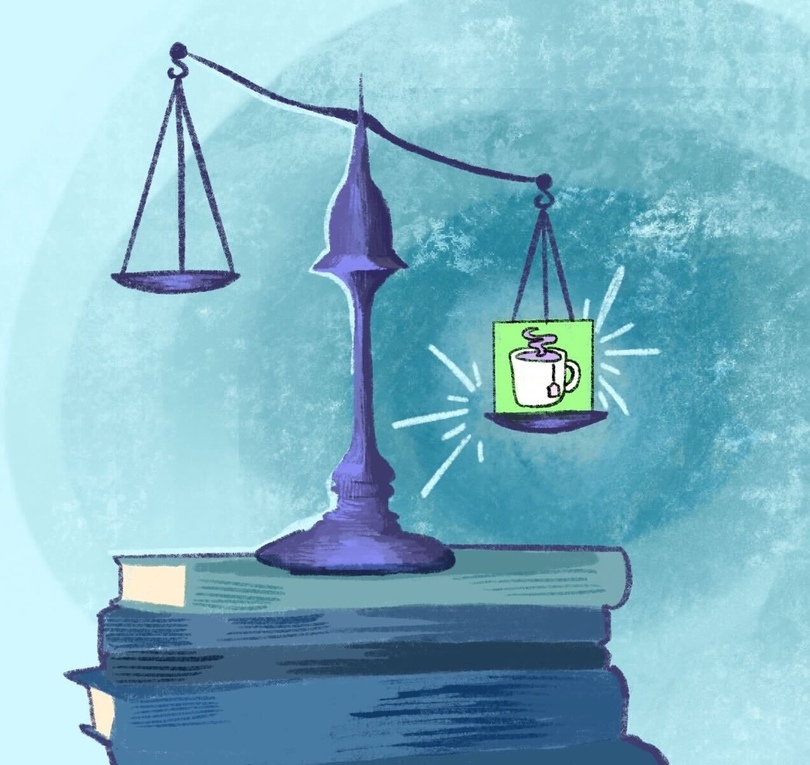What’s the Tea? The legality behind the controversial ‘safe dating tool’ app.

The Tea for Women app, which allows women to share their dating experiences with men through Yelp-style reviews, is circulating at SU. It poses defamation and data-related legal questions for students on and off the app. Hannah Mesa | Illustration Editor
Get the latest Syracuse news delivered right to your inbox.
Subscribe to our newsletter here.
Over the past few weeks, the Tea for Women app has circulated across Syracuse University and other schools across the nation, allowing women to share their dating experiences with men through Yelp-style reviews.
But, the app poses many legal questions for both students who are posted on the platform, as well as those who browse it.
The app serves as a “dating safety tool” to protect women by performing background checks and sex offender searches on men in their area, according to its website. The app, launched in 2023, became popular on college campuses this fall, with many students scrolling through or posting their opinions about it on other platforms like TikTok.
Some college students use the app’s anonymous feature to post photos of people, usually peers, and invite others to join in on anonymous conversations about them. Tea uses a verification method to ensure all users are women to make it “the safest space to spill tea,” its website says.
Ryne Weiss, a research director at the Foundation for Individual Rights and Expression, said Tea is very similar to YikYak, an anonymous chat app for college students, and the social media website Reddit.
“About 10 years ago, a number of universities were trying to ban YikYak, or ban it from their local networks, so this is very similar to that,” Weiss said.
The Tea app created unexpected consequences, especially for college students, with innocent people targeted with false accusations and damaging rumors shared by strangers, according to plaintiffs in defamation suits against the app’s users.
Minc Law, a firm dedicated to online defamation and harassment, noted that defamation on Tea is common, but creates “unique vulnerabilities” due to the app’s animosity .
On its website, the firm noted the app’s anonymity “encourages extreme behavior” due to a lack of accountability, and that Tea’s layout is “creating an environment where false accusations spread rapidly among strangers.”
Another law firm, Heninger Garrison Davis, LLC, said posting on the app can lead to both civil and criminal liability.
“Posting unverified or false claims—like infidelity, abuse, or criminal accusations—can lead to defamation claims if those statements damage someone’s reputation,” the firm wrote on its website.
The firm also noted that posting on the app can lead to harassment or cyberbullying suits, invasion of privacy, non-consensual intimate images and copyright infringement.
For someone posted on Tea, the best thing to do is take steps such as preserving evidence, submit a request for removal through the app store or seek legal counsel for defamation or privacy violations, its website says.
However, men posted on the app are not the only ones at risk for legal consequences.
On July 25, the app confirmed a data breach, which leaked users’ IDs, photos and other information, CNN reported. Hackers accessed Tea’s data and stole around 72,000 user images, containing 13,000 selfies used for user verification and 59,000 images from users’ posts, comments and private messages.
The images ended up on 4chan, a website known for hosting controversial material. Tea confirmed that hackers didn’t access email addresses or phone numbers.
A separate leak exposed over 1.1 million private messages, which revealed personal discussions regarding infidelity, medical decisions and contact information, according to Heninger Garrison Davis, LLC.
As of Tuesday, class-action lawsuits have been filed against the app, claiming the company “failed to secure user data and notify affected individuals,” putting women at an increased risk. According to one complaint, some leaked images contained metadata that allowed third-party apps to track users’ locations.
Weiss said anonymous apps are “nothing new under the sun,” but are “complicated” when talking about legal protections under the First Amendment.
“Defamation is a category of unprotected speech. It doesn’t enjoy First Amendment protection,” Weiss said.





